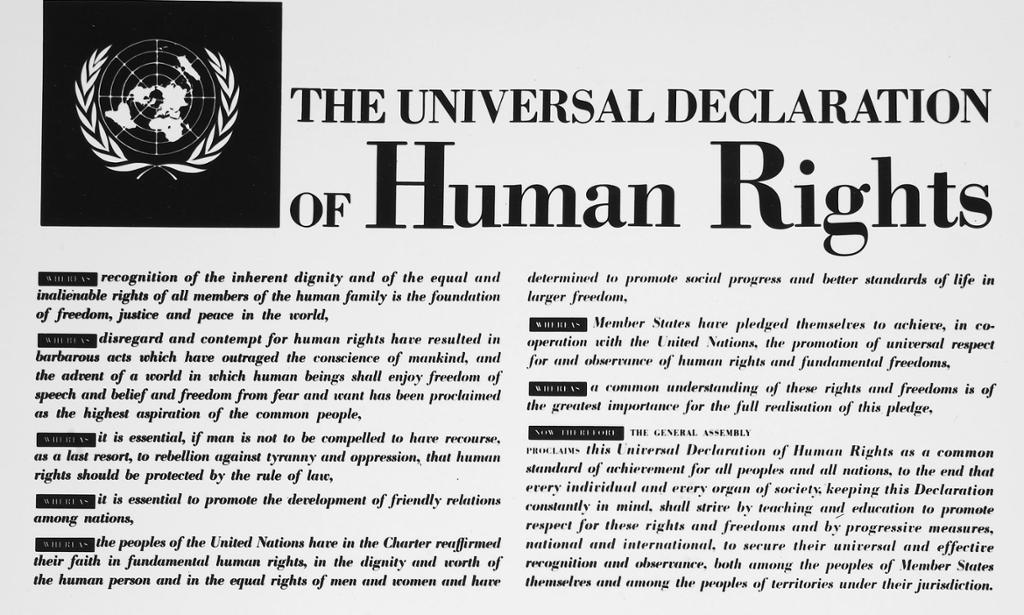How Universal Are Human Rights?
How Universal are Human Rights
You will find all these words in the text you are about to read. What do they mean? Find a synonym for each of the words.
The UDHR was adopted by the United Nations General Assembly on December 10, 1948. After the atrocities witnessed during World War 2, the consensus within the world community was that the UN Charter, which had been adopted in October 1945, was not specific enough with regards to individual human rights. This opened up for the creation of the UDHR.

The UN Human Rights Commission, responsible for framing the UDHR, consisted of leaders and activists from both Eastern and Western societies, cultures, and religions. With so many cultures and religions represented, it was difficult to fully agree on a common definition of human rights. This is a conflict we still see today.
In conflicts regarding the understanding of human rights, two opposing views often emerge – one mirroring the Western world and its values, and the other reflecting the values of many Asian and African states.
We see that Western countries generally emphasise the universal approach to human rights: the belief that certain rights are the same for everyone, regardless of gender, race, ethnicity, and religion, even if they contradict local practices and beliefs. Everyone has the right to self-expression and to live the life they choose without interference from the government. The focus here is on individual human rights that apply to everyone.
However, in many African and Asian countries, the rights of the community supersede the rights of the individual. The family, the village or the nation play a much more important role than the individual, and excessive individualism is often regarded as a threat to unity and social order in a country. It is also believed that each culture should determine the rights the people enjoy, and not the ideas found in Western societies. This mindset is often referred to as cultural relativism.
These two opposing views have often led to conflicts in the international community, and there are countless examples of state practices and regional traditions violating the rights stated in the UDHR. For example:
- Female genital mutilation (FGM) has been documented in 30 countries, primarily in Africa. Sudan is the country that has most recently criminalised FGM (2020). However, FGM still persists in many poor, rural areas where traditions outweigh the laws of the state.
- In Saudi Arabia, the public practice of any form of religion other than Islam is illegal. It is also illegal for Muslims to change religion or renounce Islam. By law, blasphemy is punishable by death, although most people only receive a long prison sentence.
- Homosexuality is illegal in 72 countries and punishable by death in 11 countries. When President Museveni of Uganda was criticized by the West for signing anti-gay legislation into law, he told the outside world to “respect African society and their values. If you don’t agree, just keep quiet. Let us manage our society."
President Museveni touches upon an important point: Does the global community have a right to interfere and criticize local practices that they don’t agree with? Perhaps not...
Firstly, people in countries where collective rights are more important than individual rights would argue that the West does not understand their countries well enough, and that the UDHR fails to account for the different cultural values and norms found in non-Western countries. For many people, the West does not necessarily represent a better way of life. Secondly, even though Western countries consider themselves defenders of human rights, many of them have serious human rights problems of their own, and should therefore not criticize others. Even Norway has been condemned by other countries for violating human rights.
Still, the reality is that many communities use traditional values as an excuse to undermine human rights and suppress vulnerable groups in society. By pointing to traditions and norms you can easily keep certain groups away from equal opportunities and political participation. For example, discrimination of women is often defended or legitimized by reference to culture and tradition. The same thing goes for other groups, like homosexuals or ethnic minorities.
Another thing that should be mentioned is that many countries often do not have the resources to secure the rights of every individual. For example, the declaration states that everyone has a right to an education, to adequate health care and to security in case of unemployment. These rights demand a well-functioning society and good financial funding, and this is not always in place.
There is no doubt that the goals set forth in the UDHR are very ambitious, and the upholding of human rights in the world today can often seem to be an impossible task, both for Western and Eastern countries. The UDHR is not perfect, but the declaration has undoubtedly played an important role in emphasizing the value of all human life.
Relatert innhold
Tasks related to the article "How Universal Are Human Rights?"